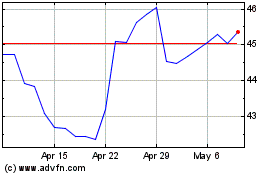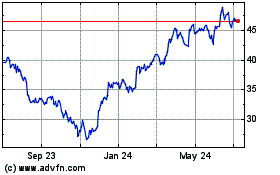Why GM's Spectacular Profit Won't Change Investors' Minds About Detroit -- Heard on the Street
November 05 2020 - 1:52PM
Dow Jones News
By Stephen Wilmot
Detroit has shown that it can deal with pandemics. The question
now, particularly as results from Tuesday's presidential election
continue to favor Joe Biden, is whether it can handle electric
vehicles.
General Motors reported $5.3 billion of adjusted operating
profit for the three months through September, giving a margin of
14.9%. This kind of profitability is what investors typically
expect from other makers of technologically complex products, but
remains almost unheard of in the car industry. GM's shares rose
just 2% on a strong day for stocks. Ford and Fiat Chrysler set a
high bar with only slightly less spectacular numbers last week.
GM has managed the challenges posed by Covid-19 particularly
well, but in the latest quarter it was also helped by very unusual
market conditions. Production stopped because of the lockdowns in
the spring, depressing both inventory and costs. Then demand for
vehicles, particularly pickup trucks, stormed back as consumers
shunned public transportation and air travel. For the third
quarter, the combination led to good sales and even better
prices.
Profits will normalize in the current period as austerity
measures unwind, yet revenue could remain strong. GM's inventories
on U.S. dealer lots at the end of September were only 11% above
their trough at the end of June and well down from last year. It
has a suite of new sport-utility vehicles. Cheap financing and the
pandemic may well continue to offset any weakness from consumer
caution at a time of high unemployment.
With GM stock back to its pre-Covid levels, though, none of this
reassuring news is likely to change investors' minds. To earn a
better stock-market valuation, the largest U.S. auto maker needs to
show returns on the billions of dollars it is plowing into electric
vehicles.
A Democratic White House would help, particularly by working in
concert with California, which sets its own rules. President Trump
rolled back Obama-era emissions regulations this year, but
California has only doubled down on the fight against climate
change with last month's move to ban combustion engines by 2035.
Vehicle manufacturers would like to avoid dual-speed regulation at
all costs.
However, difficult questions about the profitability and
competitiveness of Detroit in the new technology won't be answered
for years. GM made a high-profile show of electric-vehicle strength
with last month's launch of the Hummer EV, and spent much of its
call with analysts Thursday vaunting the new battery system that
underpins it. The risk for the company -- which highly valued
electric-vehicle startups don't face -- is that such products
undermine others in its lineup that earned it that 14.9% margin in
the third quarter.
Until a clearer picture emerges of how the technological
transition will pan out for Detroit, it is hard to see GM earning a
core role in investor portfolios -- however strong this year's
crisis management.
Write to Stephen Wilmot at stephen.wilmot@wsj.com
(END) Dow Jones Newswires
November 05, 2020 13:37 ET (18:37 GMT)
Copyright (c) 2020 Dow Jones & Company, Inc.
General Motors (NYSE:GM)
Historical Stock Chart
From Mar 2024 to Apr 2024

General Motors (NYSE:GM)
Historical Stock Chart
From Apr 2023 to Apr 2024
